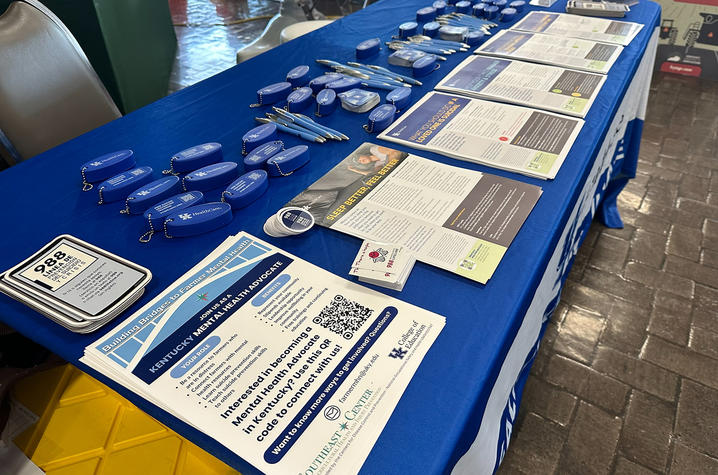UK projects supporting farmer mental health at National Farm Machinery Show

LEXINGTON, Ky. (Feb. 15, 2024) — The University of Kentucky’s Building Bridges to Farmer Mental Health Project has representatives at the National Farm Machinery Show in Louisville this week to connect with farmers and farm families. The mental health project is funded by a grant from the National Institute for Occupational Safety and Health (NIOSH).
Building Bridges to Farmer Mental Health seeks to address farm stress, decrease mental health challenges and reduce mental health access barriers among Kentucky’s farmers and rural communities by leveraging community partnerships and training Mental Health Advocates.
“We look forward to connecting with farmers and those who interact with farmers on a regular basis at the National Farm Machinery Show to learn from their lived experiences and provide mental health resources and an opportunity to be an advocate in their community,” said Melinda Ickes, Ph.D., principal investigator of the grant. Ickes is acting assistant dean of research at the UK College of Education, professor in the UK College of Education Department of Kinesiology and Health Promotion, and a 2023-24 University Research Professor.
Examples of challenges and barriers impacting farmers’ mental health include:
- Farmers frequently experience uncontrollable stress like machinery breakdown, hazardous work conditions, crop and livestock disease, and commodity market fluctuations.
- The accumulation of stress can lead farmers to experience maladaptive coping mechanisms, symptoms of anxiety and depression, and suicidal behaviors.
- In the U.S., male farmer suicide rates have risen since 2003 and parallel the rates of all U.S. males.
- Farmers, specifically in the Southeast, consistently report lack of resources for mental health and well-being as a barrier to health and well-being.
The Building Bridges to Farmer Mental Health Project has been making strides in recruiting Mental Health Advocates across Kentucky communities. An initial cohort launched in December and recruitment for the second cohort is underway.
Additionally, the project recognizes the importance of reaching the next generation of farmers and incorporates training for pre-service agriculture educators, including recent sessions at Murray State University and Abraham Baldwin Agricultural College. The training uses an evidence-based dialectical behavioral therapy (DBT) curriculum focused on mindfulness, emotional regulation, interpersonal effectiveness and distress tolerance.
Understanding how to best tailor content for pre-service agriculture educators and current educators will be invaluable as the project progresses, Ickes said.
Partnerships with regional universities and statewide stakeholders are imperative to ensuring resources are readily available for farmers and their families. Farmers in distress will be referred directly to the Eastern Kentucky Telepsychology Clinic, where staff will also receive agriculturally responsive training.
“We know this is not a short-term fix, and along with the Southeast Center for Agriculture Health and Injury Prevention and their partners, we are invested in building the infrastructure locally and statewide so farmers and those working with farmers know where to turn for support,” Ickes said.
Additional UK projects with representatives at the National Farm Machinery Show include the Southeast Center for Agricultural Health and Injury Prevention and representatives from the UK Martin-Gatton College of Agriculture, Food and Environment.
For more information about the Building Bridges to Farmer Mental Health Project, contact farmermhn@uky.edu
This project is supported by the National Institute of Occupational Safety and Health (NIOSH), Centers for Disease Control and Prevention of the U.S. Department of Health and Human Services (HHS) as part of an award totaling $3.1 million with 0% financed with non-governmental sources. The contents are those of the author(s) and do not necessarily represent the official views of, nor an endorsement, by NIOSH, CDC, HHS, or the U.S. Government. For more information, please visit www.cdc.gov/niosh.
As the state’s flagship, land-grant institution, the University of Kentucky exists to advance the Commonwealth. We do that by preparing the next generation of leaders — placing students at the heart of everything we do — and transforming the lives of Kentuckians through education, research and creative work, service and health care. We pride ourselves on being a catalyst for breakthroughs and a force for healing, a place where ingenuity unfolds. It's all made possible by our people — visionaries, disruptors and pioneers — who make up 200 academic programs, a $476.5 million research and development enterprise and a world-class medical center, all on one campus.




